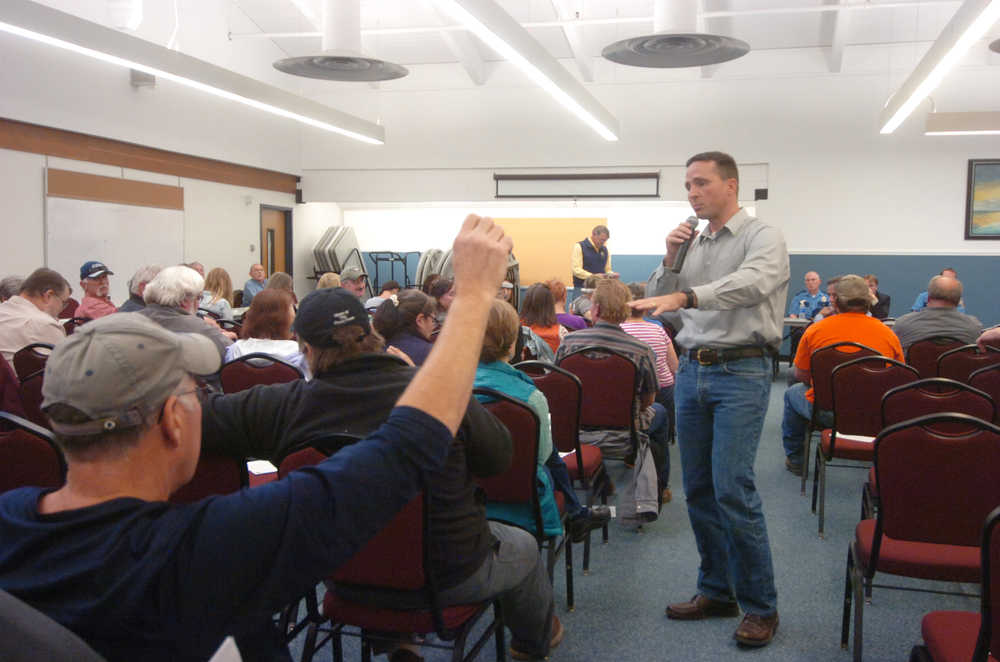Close to 100 Nikiski residents aired their concerns at a public hearing to address a measure on the Oct. 6 ballot that, if enacted, would establish a Nikiski Law Enforcement Service Area in the unincorporated community.
Proposition 2 asks voters to approve the service area, which would follow the same boundaries as the Nikiski Fire Service Area — which includes an area on the west side of the Cook Inlet — as well as a 1.5 mill tax that would raise approximately $2.2 million by July 2016. The measure would also create a five-person service area board, and the members would take office immediately after its passage.
The meeting began with a moment of silence for Ann Dooley-Krogseng, a former prospective board member for the service area who died in an ATV accident on her property on Sept. 24.
Most of the questions focused on the specifics of what a potential police agency would look like in Nikiski, what would happen in the event that the service area became borough-wide and what the Alaska State Troopers’ duties would be if the service area is established. Others were concerned with how the areas across the Cook Inlet would affect potential services, equipment and staffing, and the fact that the borough assembly will have final say on any plan the service area board might recommend.
“We didn’t have that (power) in the first place,” Carpenter said in response. “This is the form of government that we have. We don’t have an option.”
Representatives from the Alaska State Troopers, the Kenai Peninsula Borough, the District Attorney’s Office, the prospective service area board and other organizations attended to address questions. Borough assembly member Wayne Ogle facilitated the meeting and explained the process the service area board members would follow should the proposition pass. The measure allows for either the creation of a police agency or the contracting of services from an existing agency.
Those in opposition to the measure cited the new tax and few confirmed specifics about what a police agency would actually look like — the number of officers, their duties, equipment and building space — as reasons for their hesitation. Others claimed creating a law enforcement service area is a small fix for a larger issue, which they say is high rates of drug addiction in Nikiski.
One attendee asked what kind of crime statistics were used to determine that Nikiski indeed has a crime problem. Carpenter said the fact that more than 300 upset residents showed up to last year’s meeting that led to the formation of a Nikiski Community Action Group and got the ball rolling on the proposition was enough proof for the prospective board members.
Since September 2014, troopers have responded to 28 incidents related to theft, burglary or both in Nikiski, according to the daily dispatches published by the Alaska State Troopers. They also responded to one incident of theft in which the crime occurred in Sterling, but the person was contacted by troopers in Nikiski.
Another issue that will affect Tuesday’s vote is the service area board seat left open in Krogseng’s wake, as her name will still appear on the ballot. Several Nikiski residents have submitted write-in campaigns, but she could technically still win the election if she gets the most votes. In that case, Borough Mayor Mike Navarre would appoint someone to fill the 2-year term.
Carpenter said he would prefer a write-in candidate to win the election, so as to keep as much power in local hands as possible.
“I’m going to encourage candidates to step up and run a write-in campaign,” he said. “If they don’t do that and the borough mayor appoints (the seat) then that’s what we’ve got to work with. It would be preferable for Nikiski to put their own people in there rather than have a question mark of who somebody else is going to appoint.”
Three residents stood up at the meeting and announced their intent to run for the board on write-in campaigns. Tim Colbath, a resident of Nikiski for 18 years and an animal welfare advocate, said his experience as part of the original community action group would inform his decisions as part of the board.
“I grant you my main forte is animal welfare, but in so many occasions that enters into human welfare as well,” Colbath said. “It seems a natural progression.”
Jason Ross, who served in the United States Army for five years, said he has mostly kept up with the community action group’s progress via Facebook until recently. However, he has been a long-time supporter of increased police presence in Nikiski, he said.
“I want to be able to help contribute to my community in a way, and I think this is an important issue that needs to be addressed here,” Ross said. “I’m willing to take the time.”
Pete Piccini, a retired sheriff with 23 years of law enforcement experience, said Krogseng actually reached out to him previously and asked him to run for a seat on the service area board. He declined at the time because he felt his professional career was over, he said, but the unfortunate circumstances that caused her seat to reopen made him to change his mind.
“I think my experience would be a value to the board in what we want to do here,” Piccini said.
Overall, Carpenter was pleased with the public meeting and the discussion it facilitated with residents, he said. Clearing up confusion and answering questions was the goal, and Carpenter said he thinks the experts were able to do that for the voters.
“I have been monitoring Facebook traffic, and it has been a whole lot of negative and a little bit of positive,” he said. “And tonight I heard a whole lot of questions, and I didn’t hear a whole lot of negative.”
Reach Megan Pacer at megan.pacer@peninsulaclarion.com.

